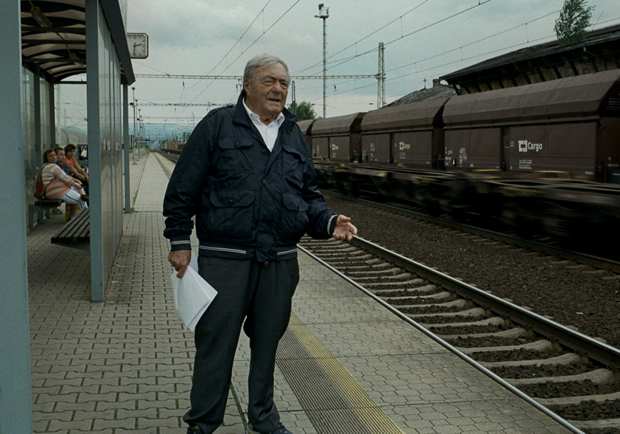Editor's Note: We can't all make it to the Toronto International Film Festival (which is too bad, since it's where some of the best films of the next year will be shown). But CT has the next best thing: daily updates during the Festival from our critic Ken Morefield. Stay tuned for the next week for capsule reviews and reflections on some of the world's most important movies.
The Last of the Unjust (Le Dernier de Injustes), directed by Claude Lanzmann Mission Congo, directed by Lara Zizic and David Turner
Claude Lanzmann's Shoah is sui generis, a universally respected nine and-a-half hour documentary, and possibly as close as one can get to a definitive historical account of the Holocaust. Last of the Unjust is more limited in scope, but it is an important historical document in its own right. Lanzmann builds the film around a sustained interview in 1975 with Benjamin Murmelstein, a Jewish Elder at Theresienstadt who spent eighteen months in a Czech prison before eventually being acquitted of collaborating with the Nazis. The result is a dialogue between two rigorously honest men. It explores the boundaries of moral and ethical responsibility when faced with circumstances that remain unfathomable to those who have not lived through them.
The interview segments are certainly intellectually challenging. But when Lanzmann reads from Murmelstein's book describing the camp operations while literally retracing the steps taken by Jews from the train station to the camp, the result is something quietly, almost unbearably, painful.
One of the great achievements of Last of the Unjust is the way it forces us to reexamine some of our most dearly held assumptions. I've always believed that a long view of history gives us more clarity and, God willing, fairer judgments than those made in the immediate aftermath of tragic circumstances. But as the final witnesses to the Shoah pass away and we are left only with the testimony they have left behind for us, that testimony still has the power to make us look anew. With each new look come new questions, and harder answers. Can aiding an evil to subvert a greater evil leave us untainted by the blood on their hands?
Mission Congo is also unbearably painful to watch at times. In just over an hour, Lara Zizic and David Turner chronicle the refugee crisis in the People's Republic of the Congo, the formation of Pat Robertson's "Operation Blessing" (OBI), and the critiques and accusations about it that continue to this day. Foremost among those accusations is that money raised for humanitarian relief was used to mine for diamonds. [See editor's note below.]
This story is not a new one. Christianity Today has written about it previously (see here and here), but the effect of drawing together various witnesses, particularly first-hand accounts of participants or members of other relief agencies present at the time, is sobering even to those who are inclined to dismiss criticism of religious leaders in general. One of Robertson's critics in the film is Richard Walden, whose Operation USA shared in a Nobel Peace Prize. Also particularly damning is the testimony of Samantha Bolton from Doctors Without Borders, who claims Operation Blessing took film of DWB's relief efforts and broadcast it as their own work. Janet Howell, a State Senator from Virginia, weighs in on the origins of a Virginia Office of Consumer Affairs report that concluded Robertson and CBN made "material claims" in their fundraising that were "fraudulent." There is also testimony from Robert Hinkle, identified as the "chief pilot" of Operation Blessing, about what was actually in the planes that he flew. But perhaps most distressing was footage of Dumi, an agricultural compound that appears very different in the documentary's footage than it does in the pictures of the website soliciting donations for that project.
Criticism of prominent Christians will inevitably invoke strong feelings. The film does not strike out at all Christians or all mission work—it focuses narrowly on Operation Blessing.
On deck: The Past; Violette; Young & Beautiful; The Double Day 1: Closed Curtain
Kenneth R. Morefield is an Associate Professor of English at Campbell University. He is the editor of Faith and Spirituality in Masters of World Cinema, Volumes I & II, and the founder of 1More Film Blog.
Editor's note: In December, The Guardian newspaper apologized to Operation Blessing and retracted its coverage of the documentary's claims.









